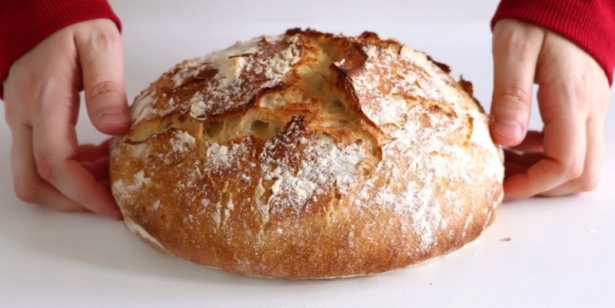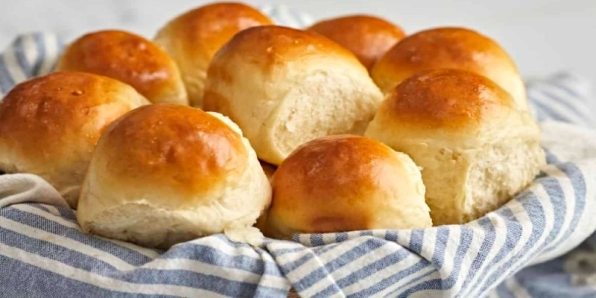Health & medical treatment
10 Affordable Health Care Options For Self-Employed Workers
1756721189000
Ever wondered if baking bread at home is too complicated? It doesn't have to be. With a few simple recipes, even complete beginners can bake fresh, warm loaves right in their kitchen. From soft sandwich bread to rustic country-style loaves, here are some of the best bread recipes that are beginner-friendly and delicious.
Ever wondered if baking bread at home is too complicated? It doesn't have to be. With a few simple recipes, even complete beginners can bake fresh, warm loaves right in their kitchen. From soft sandwich bread to rustic country-style loaves, here are some of the best bread recipes that are beginner-friendly and delicious.
If you want to start simple, white sandwich bread is a great place to start. This type of bread is soft, fluffy, and works perfectly for everything from toast to grilled cheese.
All-purpose flour
Active dry yeast
Sugar
Salt
Warm water
Butter or oil
1.Mix warm water with yeast and sugar. Let it bubble for 5–10 minutes.
2.Add flour, salt, and melted butter. Knead until the dough feels smooth.
3.Let it rise until doubled in size, then shape it into a loaf.
4.Bake at 375°F (190°C) for about 30 minutes.
The recipe is forgiving, the ingredients are basic, and the results are reliable. Slice it thick for sandwiches or thin for morning toast.

Don’t want to spend much time kneading? This recipe relies on time, not effort. It’s one of the easiest ways to get that crusty, bakery-style loaf.
All-purpose or bread flour
Instant yeast
Salt
Water
1.Stir the ingredients together in one bowl until a sticky dough forms.
2.Cover and let sit at room temperature for 12–18 hours.
3.Shape roughly into a ball and bake in a preheated Dutch oven at 450°F (230°C).
This bread develops a beautiful, crackly crust and a chewy interior without requiring heavy kneading. Beginners love it because it feels like magic: almost no work, but impressive results.
If you want something more wholesome, whole wheat bread is a significant step up. It's hearty, flavorful, and stays fresh longer.
Whole wheat flour (you can mix with all-purpose to keep it lighter)
Honey or molasses
Yeast
Salt
Warm water
Olive oil
1.Activate yeast in warm water with honey.
2.Add flour, salt, and oil. Knead until it holds together.
3.Let rise, shape into a loaf, and bake at 375°F (190°C).
This bread has a nutty taste and makes sandwiches more filling. Using honey or molasses gives a natural sweetness that balances the earthy flavour of wheat.
Not all bread has to rise for hours. Flatbread is fast, versatile, and doesn't require yeast.
All-purpose flour
Baking powder
Salt
Yoghurt or milk
Olive oil
1.Mix everything into a soft dough.
2.Roll into small circles.
3.Cook each one on a hot skillet until puffed and golden.
This bread is ready in under 30 minutes. Use it as a base for wraps, serve with curry, or brush with garlic butter for an easy snack.
Focaccia is a flat Italian bread that's full of flavour and looks impressive, even though it's easy to make.
Bread flour
Yeast
Salt
Olive oil
Warm water
Optional toppings: rosemary, cherry tomatoes, olives
1.Mix the flour, water, yeast, and salt to form a sticky dough.
2.Let rise until doubled.
3.Spread on an oiled pan, poke holes with your fingers, and drizzle with olive oil.
4.Add toppings and bake at 425°F (220°C).
Crispy on the outside, fluffy inside, and customizable with herbs or vegetables. It’s ideal for sharing or serving alongside pasta.
Yes, banana bread counts. It’s technically more of a quick bread since it doesn’t use yeast, but it’s one of the most popular starter recipes.
Ripe bananas
Flour
Sugar
Eggs
Baking soda
Butter or oil
1.Mash bananas and mix with sugar, eggs, and melted butter.
2.Stir in flour and baking soda.
3.Pour the mixture into a loaf pan and bake at 350°F (175°C) for about 1 hour.
Banana bread is sweet, moist, and perfect for beginners who want a dessert-style bread. It’s also a smart way to use overripe bananas.

Soft, fluffy rolls make any meal better. While they look tricky, they’re surprisingly beginner-friendly.
All-purpose flour
Milk
Sugar
Butter
Yeast
Salt
1.Warm the milk and dissolve the yeast and sugar.
2.Add flour, butter, and salt, kneading until smooth.
3.Let rise, shape into small balls, and place on a baking sheet.
4.Bake at 375°F (190°C) until golden.
These rolls are perfect for family dinners or holiday meals. They’re small, so mistakes don’t stand out, and even imperfect rolls taste amazing.
Once you feel confident, sourdough is worth exploring. It's famous for its tangy flavour and chewy texture.
Flour
Water
Salt
A sourdough starter (fermented flour and water culture)
1.Mix the flour, water, starter, and salt to form a dough.
2.Stretch and fold a few times during the rise.
3.Shape and bake in a hot oven or Dutch oven.
Sourdough is more advanced but rewarding. Many beginners find the process fun because it’s part science experiment, part baking. Once you have a starter, you can keep baking sourdough forever.
Measure Carefully: Bread recipes can be sensitive to the amount of flour used.
Be Patient: Rising times may vary depending on your kitchen’s temperature.
Use Steam for Crusts: Place a pan of hot water in the oven when baking rustic loaves for a better crust.
Experiment: Once you're comfortable, try adding herbs, seeds, or cheese to your dish.
Homemade bread is not only more affordable than store-bought, but it also tastes fresher and fills your kitchen with an irresistible aroma. Start with the simplest recipes, such as white sandwich bread or flatbread, and then work your way toward focaccia or sourdough. With each loaf you bake, confidence builds, and before long, bread-making will feel second nature.
How do you like this article?
Health & medical treatment
1756721189000
Recipe & Gourment
1756721254000
Travel
1756721130000
Recipe & Gourment
1756721254000
Recipe & Gourment
1756721254000
shopping
1756721062000
Health & medical treatment
1756721189000
Health & medical treatment
1756721189000
Health & medical treatment
1756721189000
Recipe & Gourment
1756721254000
Travel
1756721130000









